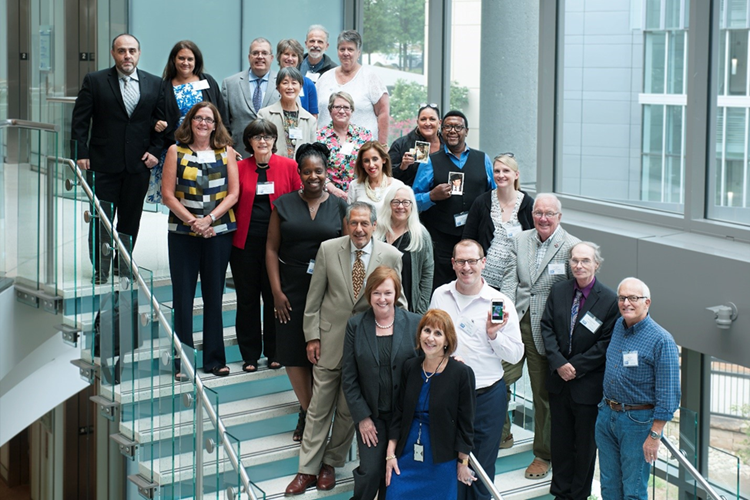Denise Cardo, MD, retires after 30 years dedicated to patient safety
Posted on by
As part of Public Health Thank You Day, celebrated every year on the Monday before Thanksgiving, we’d like to honor Denise Cardo, MD, who recently retired from public service after 30 years dedicated to patient safety.
Denise leaves a legacy of protecting the United States and the globe from some of our most challenging and urgent infectious disease threats.
Cardo joined CDC in 1993 as a medical epidemiologist in the Hospital Infections Program (later named the Division of Healthcare Quality Promotion), and after holding several leadership positions in DHQP, she was selected as division director in 2003.
Cardo is beloved across the agency for her work ethic and willingness to handle difficult situations. Her career is marked by incredible public health success, including implementing national public hospital reporting, developing strategies for the elimination of healthcare-associated infections, working to accelerate efforts against antimicrobial resistance, and launching the nation’s first hospital sepsis core elements. She has spent her career making sure healthcare facilities do their very best to protect patients, healthcare workers, and communities.
We asked Cardo about her tenure, and she shared the following tenets.

Remember the patient.
Cardo has done her work from a people-centered lens. She has experience as a CDC employee, clinician, patient, and family member. Denise believes that doing the right thing for patients should be our focus, even when it is not the most popular thing to do. “Behind the number is a person and a family. Focusing on people makes the bruises along the way more manageable,” she shares. Denise fought for public reporting of hospital infections, even though many advisors and even colleagues told her the effort was too risky and difficult. During this time, she faced backlash from decisionmakers and healthcare facilities, but she persisted. Denise partnered with other agencies, and her division led the transition of the National Healthcare Safety Network (NHSN) to support both the collection and public reporting of the data, allowing more transparency and accountability for prevention.
Over the years, Denise has also established meaningful working relationships with patient and family members to make sure their voices and knowledge are heard. She accomplished this by inviting them to CDC to share their stories. The relationships she created often started with hard conversations, sometimes resulting in families demanding CDC to take more action. Today, however these years-long partnerships have helped CDC improve patient safety, in many ways, including the release of programs like the Hospital Sepsis Program Core Elements. During Denise’s time at CDC, infections in healthcare decreased. Additionally, more healthcare facilities became able to track their progress and identify problems (from a few hundred to more than 38,000). All states now have effective programs to prevent infections in health care.
Describe actions, not problems.
Cardo prides herself on her team’s ability to solve tasks that seem “impossible.” Her action-oriented leadership skills encourage experts not just to ask, “What’s the problem?” but also, “How can we fix it?” Anyone who has been in a meeting with Denise has heard her patiently listen to data presentations and, at the conclusion, ask politely, “And what are we going to do about it?”
She has been a tireless advocate for better infection control practices, emphasizing the importance of prevention in addition to appropriate treatment. When she was working toward the elimination of healthcare-associated infections, people again told her it was impossible. “We’re not the Centers for Description of Problems,” she laughs. “We had good data; we could have just published to a journal. But these infections should not be happening. It was our job to define the goals and give people the tools they need to protect patients. I said, ‘Prove to me it’s not possible.’” Denise and her team then began studying the Toyota Production System and other strategies for clues on how to continually and incrementally improve healthcare quality and infection control, for every patient.
In the end, Denise and her team led the development of the first U.S. national action plan that established national targets for preventing infections, holding federal government agencies accountable for making progress. Her division has been instrumental in the U.S. responses to countless outbreaks, ranging from COVID-19 to fungal meningitis, medication and medical device contamination, vaccine safety, and the safety of the national blood supply and of organ transplantation. Denise won the Shepherd award for some of these efforts, nominated by grateful colleagues and international experts.
Stay humble and open to growth.
Despite her position of authority, Cardo has consistently led her teams with humility. She encourages division members to question themselves, noting that despite being world class, “gold standard” experts, we all make mistakes. That’s why Denise has always supported her clinical staff to stay on rotation at local healthcare facilities. “I want our people to put our recommendations into practice, see what works and what’s hard, and then we improve upon it,” she says. Denise has applied the same principle on her many details when she has served as interim leader for several of CDC’s major Centers in times of organizational need, including as Acting Deputy Director for the agency. She brings back what she learns from these assignments to help improve DHQP and the division’s national and global public health impacts. Cardo believes that in questioning, we all have a greater opportunity to promote transparency, as well as learn and grow from each other.
Cardo is also well known for bringing communications and policy experts with her to important meetings and events and including them discussions about the overall strategic direction for the division. “We must have them at the table from the start,” she says empathically. “Empower your colleagues, give them a voice; they do more than update websites.” Cardo invested in communications expertise in media relations, risk communications, communication science, and prioritized policy outcomes. Many of the agency’s most senior communication and policy leaders began their career in her division.
Partner toward perfection.
Within her division, Cardo has encouraged the concept of partnering and co-creating. “Across HHS, CDC, our own division: we have the same goals, we just use different tactics. You must look at the landscape and help to fill the gaps,” says Denise, reflecting on her many accomplishments that required collaboration. This played out in many ways in her day to day, sometimes partnering with her late husband, Ken, an ICU director, to balance her prevention ideas with his more practical ones; partnering with organizations today that she may have been more adversarial many years ago; or partnering with state and local health departments to champion the needs of underserved and remote communities. “We’re serving patients, building together, and that’s what matters most.”
Denise Cardo has been a trailblazer in her career. Her service has been incomparable, and her work ethic unmatched. Her influence has extended beyond CDC, shaping policies and practices that safeguard public health on a global scale. We celebrate her remarkable journey and wish her a joyful and well-deserved retirement. Thank you, Denise, for your dedication to humanity.
About the Authors
Katy Capers, MA, is the Associate Director for Communications in CDC’s Division for Healthcare Quality Promotion.
Kendra Driver, PhD, is the Writer/Editor in CDC’s Division for Healthcare Quality Promotion.
3 comments on “Denise Cardo, MD, retires after 30 years dedicated to patient safety”
Comments listed below are posted by individuals not associated with CDC, unless otherwise stated. These comments do not represent the official views of CDC, and CDC does not guarantee that any information posted by individuals on this site is correct, and disclaims any liability for any loss or damage resulting from reliance on any such information. Read more about our comment policy ».
Comments are closed.
Thank you so much for the very useful tips
Dr. Denise Cardo's retirement after three decades of unwavering dedication to patient safety is a momentous occasion deserving of heartfelt appreciation. Her legacy is a testament to the impact that a passionate and committed medical professional can have on the lives of countless individuals. The wealth of knowledge, expertise, and compassion she brought to her role has undoubtedly elevated the standards of patient care within our healthcare community
Working with Denise in her role at the CDC has been a highlight of my work to raise awareness and save lives at Sepsis Alliance.
She will be sorely missed but I know that the culture of partnership and focus on patients will live on at CDC and beyond.
Thank you Denise!
Thomas Heymann
CEO, Sepsis Alliance